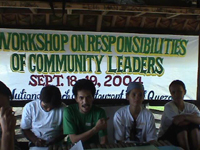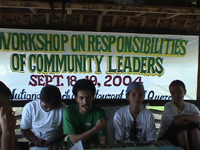

Home
Published on 7 January 2005
Translations available in:
Code of Ethics, by Sanlakas-Quezon City
by Flora SANTOS,
Pinky CASTELO CUPINO
Associated General Topics:
Ethics .
Document based on a study of the Charter of Human Responsibilities and of the conditions of organizations and communities in the Philippines, December 12, 2004
1. A leader actively seeks ideas and recommendations from the membership.
2. A leader is critical and analytical in dealing with challenges and problems of the organization.
3. A leader recognizes and respects the capabilities of the organizational members.
4. A leader is creative and resourceful.
5. A leader is a model to the whole membership, in terms of upholding values, ethics and in doing work for the organization and the community.
6. A leader is honest and understanding.
7. A leader is God-loving, humanitarian and nationalist.
8. A leader accepts criticisms from members.
9. A leader has integrity and shows strength of character.
10. A leader effectively performs obligations that are responsive to the conditions of the community and the society.
11. A leader is self-confident and shares his knowledge for the growth and development of the whole organization.
12. A leader is humble and treats all members equally.
13. A leader is at the forefront of the campaign to struggle and/or lobby for the interest and rights of the majority.
14. A leader gives importance to and implements the majority’s decision.
15. A leader upholds organizational unity.
16. A leader is steadfast in the performance of his duties and responsibilities.
17. A leader is concerned with coordinating and uniting with different organizations that work for the welfare of the citizenry.
18. A leader shows solidarity with people of different countries towards the attainment of global peace based on justice.
19. A leader recognizes equality among and does not discriminate against sexes, races and religion.
20. A leader believes in and is committed to social progress based on social justice.
21. A leader adheres to and practices collective leadership and shared responsibilities.
22. A leader gives importance to, cares for and protects the environment, which is the source of natural resources, and which is key to long-term development.
23. A leader creatively discovers ways to promote active participation of organizational and community members in organizational programs and national issues.
24. A leader promotes the welfare of his/her own family as part of the larger community that she/he seeks to serve.
25. A leader has broad, strategic, integrated and holistic perspective on socio-economic and livelihood development.
 Documents
Documents
![]() Feel free to upload the CODE OF ETHICS (RTF, 26,5 ko)
Feel free to upload the CODE OF ETHICS (RTF, 26,5 ko)



